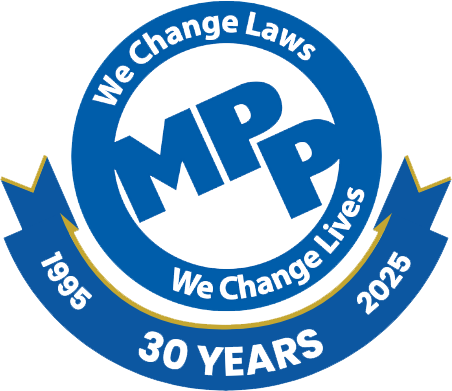- Take Action: Urge your state legislators to support a compassionate medical cannabis program!
Press Release
Nation’s Largest Cannabis Policy Reform Group Releases Report On The Laws That Lag the Furthest Behind Public Opinion

FOR IMMEDIATE RELEASE
Tuesday, March 22, 2022
Contact: Violet Cavendish
vcavendish@mpp.org
Read MPP’s report at www.mpp.org/DecrimReport
Washington, D.C. — Recognizing the 50-year anniversary of the report issued by the Shafer Commission, which investigated the effects of cannabis use on specific communities and found that small amounts of cannabis do not harm society and should not result in criminalization or jail time, the Marijuana Policy Project (MPP) released a new report — Behind the Times: The 19 States Where a Joint Can Still Land You in Jail.
MPP’s report examines the laws that lag the furthest behind public opinion: the 19 states and federal government, which have not even “decriminalized” simple possession of cannabis. In those states, it examines penalties for simple possession, arrest rates, and racial disparities in arrests and provides a glimpse at some of the damage inflicted by draconian laws. It also reviews unsolved crime rates in the states that continue to use limited law enforcement resources to arrest and jail adults for possessing a substance that is safer than alcohol.
In addition to the report, MPP led a national virtual press conference, as well as virtual press conferences in Alabama, Pennsylvania, and Texas, recognizing the 50-year anniversary of the Shafer Commission report and detailing the findings of MPP’s report.
Statements from speakers at the national press conference:
“What was true 50 years ago is even more compelling today — the cost of criminalizing millions of marijuana consumers is too high, and it is time to end this failed policy in favor of a sensible form of regulated access.” - Professor Richard Bonnie, University of Virginia School of Law, associate director of the Shafer Commission and author of “The Marijuana Conviction: A History of Marijuana Prohibition in the United States”
“It is absolutely amazing that in 2022 we have a multi-billion dollar industry and an entire ecosystem around it, and at the same time we’re still arresting almost 600,000 people a year for simple possession. Those two statements being true at the same time in the same country, this amount of time since that Shafer Report was given is just unconscionable. And that’s part of the work of MPP, we continue to go into states and try to work on the most equitable cannabis reform policy laws that we possibly can.” - Toi Hutchinson, President and CEO of the Marijuana Policy Project
“Marijuana convictions don’t just impact individuals; they impact the society at large. Keeping marijuana illegal doesn’t decrease crime rates; it just introduces new people to the revolving door of ‘justice.’ Those things impact the entire community. We need to be prioritizing public safety. Decriminalizing marijuana allows everyone involved to do that.” - Lt. Diane Goldstein (Ret.), Executive Director, Law Enforcement Action Partnership
“For immigrant communities, marijuana-related convictions can result in devastating consequences for individuals and their families, leading to immigration detention, deportation and family separation. As a result of both federal and state laws that criminalize marijuana, more than 45,000 people whose most serious conviction was marijuana possession have been deported since 2003. And marijuana offenses are consistently among the top 10 most serious convictions of people deported.” - Ami Kachalia, Campaign Strategist at the American Civil Liberties Union of New Jersey
“Within my own influential circles, I have lawyers and professors and my sorority circles where I am sharing the report. A lot of people didn’t know about the Shafer Report. A lot of people are surprised at how many states still have such harsh penalties, even the states that also have medical programs.” - Dasheeda Dawson, founder of Cannabis Regulators of Color Coalition
Speakers at the Pennsylvania press conference included DeVaughn Ward, Senior Legislative Counsel, Marijuana Policy Project; State Rep. Jordan Harris (D-186); State Rep. Joanna McClinton (D-191); and Dr. Christi Smith, Law Enforcement Action Partnership.
Speakers at the Texas press conference included Kevin Caldwell, Southeast Legislative Manager, Marijuana Policy Project; Ann Lee, Founder and Executive Director, Republicans Against Marijuana Prohibition; Laurie Zapinski, arrestee, Texas NORML; State Rep. Joe Moody (D-78), sponsor of decriminalization legislation; and Officer Bryan Rose (Fmr.), Law Enforcement Action Partnership.
Speakers at the Alabama press conference included Olivia Naugle, Senior Policy Analyst, Marijuana Policy Project; Jerome Dees, Alabama Policy Director, Southern Poverty Law Center; and Leah Nelson, Research Director, Alabama Appleseed.
To view recordings of the press conferences, follow the links below.
- National Press Conference: https://youtu.be/5rsIN0nGBys
- Pennsylvania Press Conference: https://youtu.be/zU0gI9-Ljm8
- Alabama Press Conference: https://youtu.be/GiEWdPYmUaE
- Texas Press Conference: https://youtu.be/NCOqE-yjNE8
###
Founded in 1995, the Marijuana Policy Project (MPP) is the nation’s leading cannabis policy reform organization. MPP has played a central role in passing dozens of cannabis policy reforms in states across the country, including 14 successful cannabis legalization campaigns, and also works to advance federal reforms.
